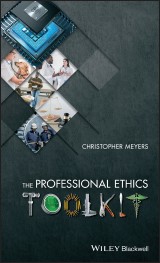Details
The Professional Ethics Toolkit
1. Aufl.
|
17,99 € |
|
| Verlag: | Wiley-Blackwell |
| Format: | EPUB |
| Veröffentl.: | 09.04.2018 |
| ISBN/EAN: | 9781119045182 |
| Sprache: | englisch |
| Anzahl Seiten: | 224 |
DRM-geschütztes eBook, Sie benötigen z.B. Adobe Digital Editions und eine Adobe ID zum Lesen.
Beschreibungen
<p><i>The Professional Ethics Toolkit</i> is an engaging and accessible guide to the study of moral issues in professional life through the analysis of ethical dilemmas faced by people working in medicine, law, social work, business, and other industries where conflicting interests and ideas complicate professional practice and decision-making. </p> <p>Written by a seasoned ethicist and professional consultant, the volume uses philosophical ideas, theories, and principles to develop and articulate a definitive methodology for ethical decision-making in professional environments. Meyers offers the benefit of his expertise with clear and practical advice at every turn, guiding readers through numerous real-world examples and case studies to illustrate key concepts including role-engendered duties, conflicts of interest, competency, and the principles that underpin and define professionalism itself. </p> <p>Following the format of <i>The Philosopher’s Toolkit</i>, <i>The Professional Ethics Toolkit</i> is an essential companion to the study of professional ethics for use in both the classroom and the working world, encouraging students and general readers alike to think critically and engage intelligently with ethics in their professional lives.</p>
<p>Acknowledgments xii</p> <p><b>Introduction 1</b></p> <p>Opening Thoughts 2</p> <p>Being and Acting Professional 5</p> <p>Definition and Listing 6</p> <p>Cases 7</p> <p>Health‐care professionals and the conscience clause 7</p> <p>Defending the indefensible 8</p> <p>Getting by with cheaper materials 9</p> <p>Note 10</p> <p>References 10</p> <p><b>Part I Theory, Concepts, and Ethics Reasoning 11</b></p> <p><b>1 Historical Overview and Definitional Questions 13</b></p> <p>1.1 Some History 16</p> <p>1.1.1 The rising role of science 17</p> <p>1.1.2 Impact of the European Enlightenment 18</p> <p>1.1.3 Organizing to differentiate 19</p> <p>1.1.4 Formalizing the standards 20</p> <p>1.1.5 Establishing trust 21</p> <p>1.1.6 Monopolies, money, and power 22</p> <p>1.2 Defining “Professional” 23</p> <p>1.3 A Working List 30</p> <p>1.4 Types of Professional–Client Relationships 32</p> <p>1.4.1 Agency 33</p> <p>1.4.2 Paternalistic (or parentalistic) 33</p> <p>1.4.3 Contractual 34</p> <p>1.4.4 Affinity 34</p> <p>1.4.5 Fiduciary 35</p> <p>Notes 35</p> <p>References 36</p> <p><b>2 A Model of Ethics Reasoning 38</b></p> <p>2.1 Relativism, Absolutism, and Contextualism 40</p> <p>2.2 Deontology 43</p> <p>2.2.1 Immanuel Kant 44</p> <p>2.3 Utilitarianism 48</p> <p>2.3.1 John Stuart Mill 49</p> <p>2.4 Context, Context, Context 51</p> <p>2.5 Ross and Pluralistic Deontology 53</p> <p>2.6 A Model of Ethics Reasoning 57</p> <p>2.6.1 A method and steps 59</p> <p>2.7 Moral Principles 63</p> <p>2.8 Case: Cutting Corners 65</p> <p>Notes 66</p> <p>References 66</p> <p><b>Part II Concepts, Principles, and Norms within Professional Environments 69</b></p> <p><b>3 Autonomy and Respect for Persons 73</b></p> <p>3.1 Autonomy in the World 75</p> <p>3.1.1 Kant and moral agency 77</p> <p>3.1.2 Mill and developed selfhood 79</p> <p>3.1.3 Variable autonomy, life plans, and identity 80</p> <p>3.1.4 Contributing and detracting factors 81</p> <p> 3.2 The Hard Work of Being Autonomous 82</p> <p>3.2.1 Additional examples 84</p> <p>3.3 Case: Which Autonomous Voice? 86</p> <p>Notes 88</p> <p>References 88</p> <p><b>4 Beneficence and Non</b><b>‑Maleficence 90</b></p> <p>4.1 Beneficence 93</p> <p>4.1.1 Finding balance in the professions 94</p> <p>4.1.2 Paternalistic beneficence? 95</p> <p>4.2 Non‐Maleficence 97</p> <p>4.2.1 Harm and incompetence 98</p> <p>4.3 Cases 100</p> <p>4.3.1 Mandatory vaccinations? 100</p> <p>4.3.2 How much should you give? 101</p> <p>Notes 102</p> <p>References 103</p> <p><b>5 Competency 105</b></p> <p>5.1 Systematizing Confidence 106</p> <p>5.2 Case: Sanctioning a Colleague 111</p> <p>Note 112</p> <p><b>6 Confidentiality and Privacy 113</b></p> <p>6.1 Privacy 115</p> <p>6.2 Privacy as a Moral Root of Confidentiality 116</p> <p>6.2.1 Intimacy and confidentiality 117</p> <p>6.2.2 Deontological and utilitarian foundations 118</p> <p>6.3 Practical Considerations 120</p> <p>6.3.1 Weighing confidentiality against other principles 121</p> <p>6.4 Cases 122</p> <p>6.4.1 Balancing principles: Privacy, beneficence, non‑maleficence, honesty, and fidelity 122</p> <p>6.4.2 Tell the family? 123</p> <p>Notes 124</p> <p>References 125</p> <p><b>7 Conflict of Interest 126</b></p> <p>7.1 Definition 128</p> <p>7.1.1 Situational conflict of interest 129</p> <p>7.1.2 Conflict of interest and individual choices 130</p> <p>7.1.3 Psychology and character 131</p> <p>7.2 Types of Conflicting Inducements 132</p> <p>7.2.1 Material inducements 132</p> <p>7.2.2 Perceived conflict of interest 133</p> <p>7.2.3 Conflicts of obligation and bias 134</p> <p>7.3 Structural Conflict of Interest 136</p> <p>7.3.1 Universally present 137</p> <p>7.3.2 Roles and conflict of interest 137</p> <p>7.3.3 Bias and conflict of interest 138</p> <p>7.3.4 Managing structural conflict of interest 138</p> <p>7.4 Cases 140</p> <p>7.4.1 Accepting a gift 140</p> <p>7.4.2 What now? 141</p> <p>7.4.3 Treating everyone equally 142</p> <p>Notes 143</p> <p>References 144</p> <p>References 144</p> <p><b>8 Fidelity, Honesty, and Role‐Based Duties 146</b></p> <p>8.1 Promises 148</p> <p>8.1.1 Moral foundations 149</p> <p>8.2 Honesty 150</p> <p>8.2.1 Professionals’ duty to be informed 151</p> <p>8.2.2 Commission versus omission 152</p> <p>8.2.3 Honesty and wisdom 153</p> <p>8.2.4 Balancing duties 154</p> <p>8.2.5 Honesty and roles 155</p> <p>8.3 Cases 156</p> <p>8.3.1 Committed to the company? 156</p> <p>8.3.2 A contract is a contract 158</p> <p>8.3.3 The lying ethicist 159</p> <p>Notes 160</p> <p>References 161</p> <p><b>9 Formal Justice, Bias, and Allocation of Resources 162</b></p> <p>9.1 Arbitrary Features 163</p> <p>9.2 The Complexity of Justice 165</p> <p>9.3 Formal Justice 166</p> <p>9.3.1 Justice and objectivity 167</p> <p>9.3.2 Negative impacts 168</p> <p>9.3.3 Circumstantial responses 168</p> <p>9.4 Bias 170</p> <p>9.4.1 Managing bias 171</p> <p>9.5 Distributive Justice 172</p> <p>9.5.1 What is fair? 173</p> <p>9.5.2 Rawls’s theory 174</p> <p>9.6 Cases 176</p> <p>9.6.1 Equal treatment for cheaters? 176</p> <p>9.6.2 Bias and just representation 178</p> <p>9.6.3 A just allocation of health‐care resources 179</p> <p>Notes 180</p> <p>References 181</p> <p><b>Epilogue: Democratization and the Changing of Professions 182</b></p> <p>Some History 184</p> <p>Democratization 185</p> <p>Shifting power and inclusivity 185</p> <p>Commercialization 186</p> <p>Transforming Society and the Professions 187</p> <p>Notes 189</p> <p>References 189</p> <p>Index 191</p>
<p><b>Christopher Meyers</b> is Professor Emeritus of Philosophy and Director Emeritus of the Kegley Institute of Ethics, California State University, Bakersfield. He is also ethics faculty at Kern Medical Center, the hospital ethicist for Adventist Health of Bakersfield, ethics consultant for multiple other regional health care organizations, and a regular contributor to local and national media. He is the author of three books and nearly fifty scholarly articles.</p>


















